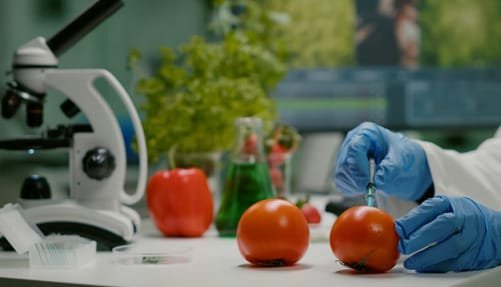Consumers have been horrified for years by the tastelessness of tomatoes sold in supermarkets, which sometimes prioritize size over taste. A recent scientific discovery might change that, though. Promising a sweeter experience without sacrificing crop output, researchers have found a method to genetically modify tomatoes to increase their sweetness while keeping their size.
Why Have Tomatoes Lost Their Sweetness?
Wild tomatoes, the forebears of today’s commercial variety, yield little, delicious fruit. But since tomatoes have been cultivated and mass-produced, high yields have become a top concern, resulting in tomatoes sometimes being bland in taste but ten to a hundred times larger than their wild cousins. Scientists think they have discovered the answer by altering genes linked to fruit sugar levels.
Scientists recently disclosed that two genes they found to function as “sugar brakes” during the ripening process, reducing the sweetness of modified tomatoes. “As farmers want bigger tomatoes and higher yield, the consumers want sweeter tomatoes,” one researcher said. By identifying the sugar-break genes, we break the negative correlation between yield and quality by breeding a sweeter tomato devoid of fruit size and yield.
How Can Gene-Editing Boost Tomato Flavor?

The researchers first looked at wild and cultivated tomato plant genomes to probe genes connected to sweetness. Although natural tomato species abound in these genes, modern-produced cultivars mostly lack them. According to the study team, the sugar brake genes found in domesticated tomatoes make an enzyme that flags a crucial sugar-making enzyme for destruction inside cells. This technique breaks down sugars that can improve taste, lowering the tomatoes’ sweetness.
The scientists precisely altered the D.N.A. of domesticated tomato plants using the gene-editing technique Crispr-Cas9, therefore deactivating the sugar brake genes. The changed tomatoes, thus, displayed a 30% increase in sugar content without any change in fruit size or yield. The gene-edited tomatoes unexpectedly showed average germination rates while having fewer, lighter seeds, suggesting that the modifications will not affect the reproductive success of the plants.
Can We Balance High Yield and High Flavor?
This gene-editing discovery solves a long-standing problem in agriculture: juggling farming needs with consumer wants. Emphasizing that this invention is feasible to satisfy consumer demand for sweeter tomatoes and farmers’ want for better yields, the researchers stressed that this might lead to a new wave of gene-edited products.
According to the findings, the sugar break genes probably developed to prioritize seed development above sweetness. Scientists think they have effectively turned some of the plant’s energy back toward generating sugars by deactivating these genes without influencing its general development or fruit size.
Will These Tomatoes Reach Consumers Soon?
These new, sweeter tomatoes have great potential to find consumers right here. The study team says, “These gene-edited tomatoes could be on supermarket shelves within three to five years.” They pointed out that some gene-edited tomato cultivars are already on sale in other markets, implying that worldwide demand for better fruit might propel regulatory approval.
Still, consumers need help in some areas, even when scientific advancement is being encouraged. Although some jurisdictions have recently changed their laws to assist the development of genetically modified crops, more secondary legislation is still needed to apply these rules correctly. Therefore, even if gene-edited tomatoes might be within reach, it could still take time before they appear in stores worldwide.
What Does This Mean for the Future of Agriculture?
The discovery provides a window into the future of agriculture, where flavor and yield no longer have to conflict. As the research team keeps working, scientists anticipate that more tasty, nutritious, and sustainable crops can be produced to fulfill consumer needs and the problems of modern farming by adjusting genes to attain particular features.

